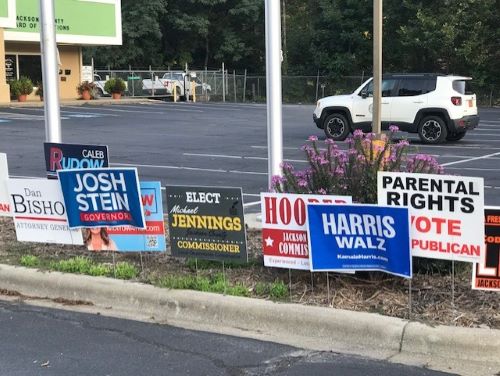
North Carolina House Bill 1074, or Citizens-Only Voting as it appeared on ballots, passed into law Nov. 5, earning 78% of NC votes. North Carolina House Rep. Destin Hall (R) introduced the bill in May of this year. The bill also appeared in varying forms on eight state ballots across the U.S.
The amendment changed specific language in North Carolina Constitution Article VI, Section I.
Before the amendment, the section read:
“Every person born in the United States and every person who has been naturalized, who is 18 years of age, and possessing the qualifications set out in this Article, shall be entitled to vote at any election by the people of the State, except as herein otherwise provided.”
Section I now reads as follows. [bold is the new language]:
“Only a citizen of the United States who is 18 years of age and possessing the qualifications set out in this Article, shall be entitled to vote at any election by the people of the State, except as herein otherwise provided.”
The amendment removes the phrase “and every person who has been naturalized,” which refers to citizens who have applied for and been granted U.S. citizenship.
“Citizen-Only Voting,” as it appeared on NC ballots, seems like a good idea at face value. But when were non-citizens allowed to vote? Never.
The 14th Amendment to the US Constitution states: “All persons born or naturalized in the United States, and subject to the jurisdiction thereof, are citizens of the United States and of the State wherein they reside.”
The U.S. Constitution overrides state constitutions, as written in the Supremacy Clause. Since no change was made federally, H-B 1074 doesn’t actually affect foreign born U.S. citizens ability to vote.
So, what’s the point?
Dr. Chris Cooper, Director of the Haire Institute for Public Policy at WCU, explains both sides of the issue.
“If you’re going to listen to folks on the left, they’re going to say ‘This is a solution in search of a problem,’ if you listen to folks on the right, they’ll say ‘doesn’t it make sense to make sure it’s as secure as possible?”
HB 1074 seems to be a precautionary measure, but the necessity is difficult to find. Left-leaning organizations in North Carolina were quick to speak out against the bill.
North Carolina Justice Center opposes the amendment, calling it “an unnecessary and anti-immigrant tactic that will further marginalize North Carolina’s immigrant communities.”
The North Carolina division of the American Civil Liberties Union says “HB1074 is an unnecessary effort to solidify a law that is already in place and to create anti-immigration rhetoric and false concerns about election integrity.”
On the other hand, Republican explanations are more difficult to find.
Jay DeLancey, co-founder of Voter Integrity Project, said in an interview with Carolina Public Press, “[Republicans] made some political calculations and said, ‘Hey, this will rally our base’… If I can get them to pass a law because it’s in their interest to do it, I’m OK with that.”
Related coverage:
N.C. voting referendum passes
2024 Elections and the impact of misinformation


